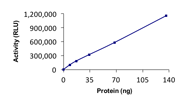
RNF34 (CARP), Active(R296-380G)
FOR BULK ORDER REQUESTS PLEASE CONTACT US
Description :Recombinant human RNF34 was expressed by baculovirus in Sf9 insect cells using an N-terminal GST tag.
Species :Human
Tag :GST tag
Expression System:Sf9 insect cells using baculovirus
Sequence :Full length
Genbank Number :NM_025126
Specific Activity :Sample Activity Plot. For specific information on a given lot, see related technical data sheet.
Purity :Sample Purity Data. For specific information on a given lot, see related technical data sheet.
Storage, Stability, and Shipping :Store product at –70oC. For optimal storage, aliquot target into smaller quantities after centrifugation and store at recommended temperature. For most favorable performance, avoid repeated handling and multiple freeze/thaw cycles.
Applications :Ubiquitin Enzyme Assay, Western Blot
Molecular Weight :68 kDa
Gene Aliases :RNF34; CARP; CARP1; hRFI; RFI; RIF; RIFF
Scientific Background :E3 ubiquitin-protein ligase RNF34, also named CARP1 (Caspases-8/10 Associated RING protein 1), acts as RING‑domain E3 ligases, ubiquitinates apical caspases and targets them for proteasome-mediated degradation. CARP gene silencing inhibits tumor cell survival and increases cancer cell sensitivity to the death ligand or chemotherapy-induced apoptosis. CARP proteins target the tumor suppressor p53 for degradation. RNF34 is also a negative regulator of the NOD1 pathway through direct interaction and ubiquitination of NOD1.
References :
1. Yang, W. et al: CARPs are E3 ligases that target apical caspases and p53. Cancer Biol. Ther. 6(11):1676-1683, 2007
2. McDonald, E.R. 3rd et al: Suppression of caspase-8- and -10-associated RING proteins results in sensitization to death ligands and inhibition of tumor cell growth. PNAS. 20;101(16):6170-6175, 2004
3. Zhang, R. et al: The E3 Ligase RNF34 is a Novel Negative Regulator of the NOD1 Pathway. Cell Physiol. Biochem. 33:2154-1962, 2014
Product Sheets (By Lot #) :
Research Areas :Apoptosis/Autophagy, Cancer, Metabolic Disorder, Neurobiology
